- Home
- William Wresch
The Canadian Civil War: Volume 4 - Mississippi Beast Page 2
The Canadian Civil War: Volume 4 - Mississippi Beast Read online
Page 2
Chapter 2 –
My troubles start at lunch
For the next weeks it felt like the city had gone into mourning. What were they mourning? The death of the player in the field, of course, and their general behavior toward the visiting team, and the loss of any friends they might have had in Arkansas, but I would argue their real loss was something they could not fully articulate. They had lost their moral authority. Where before the rebels in Louisiana were seen as racists who blew up cathedrals while the northerners were the enlightened ones, now it was clear the north was occupied by people who were capable of cheering terrible acts. What right did they have to lecture the Huguenots about their failings? For that matter, what right did they have to rule?
There was some effort at excuse making. After all, these were lacrosse fans, and they had been drinking. Besides, they only cheered until they were fully aware the man had been injured. It was all a mistake. The excuses sounded weak to everyone. After all, the proof was there in endless replays. The hit was unmistakable, the instant the man’s neck snapped was obvious, and the thunderous cheer drowned out all doubt. The fans knew what they were doing. They did it, and now there was no erasing their act.
How do you respond when you see you have done wrong? One day you have one view of yourself, and the next? You see yourself as another person – a person you don’t like. Some small percentage of Green Bayers accepted that new persona and made the common arguments of the vile – the guy had it coming, he started it, it was just a matter of time before someone responded to him… The comments were ugly and common enough that they made matters worse for the rest of the city. Is that who we are? Killers who cheer the act and then blame the victim? For those willing to accept the blame, and that was most of the city, just seeing people on the street and meeting their eyes was a chore. Shame weighed on young and old like boulders hanging from every shoulder. A man came to our city, and seventy thousand of us cheered when he was killed. Who does something like that? We do.
The political ramifications were obvious, so obvious they were almost a relief for those who got to put their minds to a practical problem. How do you shore up whatever relationships are left, and limit the damage to the country? There were public relations meetings to attend, and press releases to craft, and television interviews to prepare. I knew Elise would not be waiting for me when I got home from the match. I knew I might not see her for weeks. The leaders of the nation would be in crisis meetings for weeks. And they were. I think it was mid-May before she was home for dinner, late May before she came home for dinner and then did not go straight back to work.
Those of us not engaged in damage control, just average people who went back to average jobs and the daily chores of life, we talked much less than we ever had before in our lives. I would see people coming down the hall at the university, and the closest we got to a conversation was something along the lines of “Hi, how you doing, fine, you? Yes” as we continued walking, barely slowing down as we exchanged those few pathetic words. Why would we want to talk? What would we say? Could anything come out of our mouths that did not seem silly, insensitive, or crude? And as much as we worried about what we might say, we were even more worried about what our friends might say. Might they take some wild approach to the killing and attempt to justify it, minimize it, repaint it in some way, and in the process cause us to lose all our respect for them? The simplest way to ensure they did not say something stupid about the killing was to give them no chance to say anything. So no one talked to anyone.
We non-governmental types just did our jobs. I graded final exams. Where I can normally grade a stack of essay exams in two days, I spent five days on one set. No student has ever had an exam answer read as thoroughly as those students did. It was a relief to read them - a distraction. I wrote more comments in the margins of those papers than the margins could hold, and then just turned the papers over and continued on the back. I doubt more than two students ever read past the grade at the top of the paper, but I didn’t care. I wanted to engage with those students about the exam questions. The truth is, I wanted to engage anybody about anything other than what I had seen at Lambeau. And I will bet 90% of Green Bay adults were doing the same thing as me. Worker productivity must have gone through the roof.
Eventually I ran out of exams to grade, so I turned in my grade reports, and then started working again on my book. That might take me through the summer. It would also take me to a different time, a time I might feel better about the people walking the streets. My office was quiet, a good place to work. I would get there around seven in the morning, and stay until nearly dark. Lunches I would try to get outside. I avoided the faculty cafeteria, and I suspect everyone else did too. The golf course was a short walk to the east of the campus, and they had some seating outside under umbrellas. Conversations at adjoining tables were generally about chips that went in and putts that didn’t, good innocuous topics that were safe. I always had the crepe of the day and some lemonade, and enjoyed my half hour or so in the open air.
I followed that routine for about three weeks when one day David Starr showed up at my table. He looked like he had come for a round of golf with the university president. He had a blue polo shirt that showed off his tan – and his muscles, white pants with a crease that seemed sharp to the point of defying physics, and deck shoes with no socks. He was about thirty, so he was no preppy, but I suspect most preppies hoped they would look that polished when they grew up. He didn’t hesitate or ask, he just pulled the chair out next to mine and sat down.
“It’s been a while.” The way he sat back in his chair, and turned slightly to me, you would have thought we were lifelong friends. His smile matched that impression – happy to see me, but not overly excited, as if we got together regularly and would continue to do so for ever.
“What are you doing here?” Having not seen him since New Orleans nearly a year ago, I was completely confused. To me he had stepped into a new place at a new time. I had never expected to see him in Green Bay. Why would I, he worked for the consulate in New Orleans.
“I was in the area and thought I would see how you were doing. How’s the food here, by the way?” He picked up a menu, but paid no particular attention to it.
“The cook is French. Order anything other than a cheeseburger, and you will get a great meal.”
“Ha. I like that.” He laughed as if I had just said something brilliant. As he did, I happened to look over his shoulder and saw several people looking our way. It took me a moment, and then I realized we were speaking English. Naturally people would notice two foreigners in their midst.
“Will you be visiting long?” I asked, switching to French.
“I’m really not sure.” He replied in English. What kind of spy was this guy? Did he purposely want to stand out?
“Did you want to see me about something?” I continued in French. Maybe if I gave him a couple more answers in French he would get the hint.
“Well, I did have a letter for you.” He persisted in using English. He reaching into a pocket and pulled out a small envelope that was nearly hidden in his hand. He slid it across the table to me and placed it partially under my plate. Was he worried it would blow away? “You might want to read that later.”
“Okay.” I took the letter and put it in a pocket. It would have been less dangerous if I had put a hand grenade there, but of course I was too stupid to understand that at the time.
“I have to run now, but I hope to see you again soon. We have lots to talk about.” He held out his hand and we shook, but his grip seemed a bit odd. Had he hurt his hand? As he released his grip his fingers slid along mine in a funny way. I found myself wiping my hand on my pants, although I cannot remember if his hand was sweaty, or if it was just odd in some way. In any case, he walked back through the tables and out to the parking lot where I presumed he had left his car. My crepe came, I ate it, and I
went back to my office. It would be a week before I understood how much that lunch cost me.
Back in my office, I started back on my book about the Jolliets – volume 2. The first volume was being copy edited and translated into French. It would come out simultaneously in English and in French through the University of Virginia Press and the National University Press. I had finished it a year after my last and final deadline, but at least I had finished it. Volume two was supposed to be done by August but I had barely started. What had I been thinking when I had agreed to the publication schedule?
Volume 2 was about the next two generations of Jolliets, or would it be three? I wanted to get into the growth of Green Bay and its gradual assumption as capital of a united country, I wanted to do some history of westward exploration by the Jolliets, and I wanted to include some early trading between the colony of Canada (New France) and the Louisiana colony. Would that all go together well in one volume, or should it be two or even three? And now that I knew more the backstory of western exploration, how would I tell that story while protecting some of the confidences I had promised? I was in tough ethical territory with some of that. Do I just hide the rationale behind the Sioux massacres? And then there is the Fox War and the French genocide. There was only ugliness under that rock. As an historian, I needed to tell that story. But, truth be told, I didn’t want to.
So I stared at my computer for the hundredth time, starting a sentence or two, then erasing it, staring some more, and starting again, only to erase again while the clock moved on.
At some point I remembered the letter Starr had given me. I pulled it out of my pocket, again struck by how small the envelope was. Where do you even find envelopes that size? It looked even more odd with the large lettering on the front – “Confidential. For Shawn Murphy.” Somehow it didn’t seem very “confidential” with the word spread out across the envelope in block letters that barely fit. It was like screaming at someone – “hey, let’s whisper.” Pretty odd. Inside was a single sheet of paper that said “Call Senator Dodson’s office at 202-234-9999.” Couldn’t Starr have just given me the number? Why the big mystery?
I threw the envelope in the waste basket and stared at the number. Did I want to talk with the senator? My dad was a supporter of his, but just in the sense that his business sometimes needed a little help or at least a willing ear while export legislation was being considered. My own meetings with him had been uncomfortable. He seemed to want information from me about events in Canada, events that he could just as easily read about in any newspaper. I had nothing of national significance to pass along. But here he was again, wanting to talk to me. Why?
I put the note in a desk drawer. Dodson could wait until I had made at least a little progress on the book, and it might also be better if I called home first and checked with my father to see what was going on. That would wait until evening. For now, I would get at least a couple paragraphs written if it killed me.
Louis Jolliet’s kids. That’s what I needed to be thinking about. They grow up in Green Bay. They speak the languages of the kids around them – French, Menominee, Mascoutin. They learn to read and write and do numbers. The girls learn to be French ladies and Mascoutin Princesses. The boys learn canoes, guns, bows, hunting, trading, and geography. They draw maps in the dirt until they are judged good enough to be given paper, and then they carefully draw maps of everywhere they have been and everywhere they have heard about. They use a sextant every noon. All other activity stops. Summer, winter, in between, noon is special. A sextant comes out and each boy shoots the sun. Cloudy days, rainy days, they do their best.
At age ten each boy goes out on his own for two weeks. He has to feed himself, reach the Wisconsin River at some point assigned to him, travel on to another point on the river, and map every place he has gone. He is to be home in two weeks, not one, not three. Each boy does it. Philippe comes back with bandages all over one arm and a scalp wound that needs stitches, but he doesn’t come home until he has reached his places on the river, and he arrives home exactly at the two week point, carrying the front claws of a grizzly. The other three boys would always be envious of his scars, but over time they would get their own.
In short, the boys have the childhood every kid dreams of. I enjoyed writing about it. I was not sure how I would handle the rest of the book, but the first two chapters were fun to write. It felt like a kind of breakthrough. I put aside the bigger problems I might face in this volume, and just wrote about those first years. Suddenly it was one in the morning. I was hungry and tired, but I had twenty three pages done. I left the office with a smile on my face.

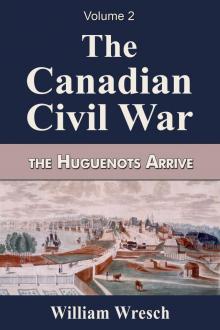 The Canadian Civil War Volume 2- The Huguenots Arrive
The Canadian Civil War Volume 2- The Huguenots Arrive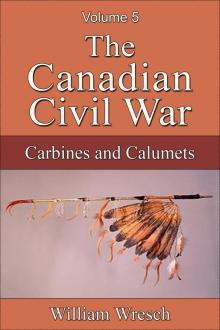 The Canadian Civil War: Volume 5 - Carbines and Calumets
The Canadian Civil War: Volume 5 - Carbines and Calumets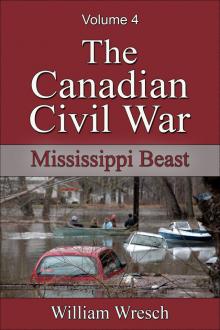 The Canadian Civil War: Volume 4 - Mississippi Beast
The Canadian Civil War: Volume 4 - Mississippi Beast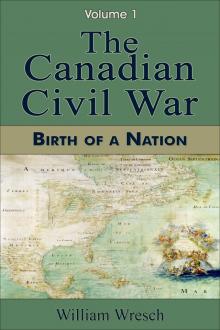 The Canadian Civil War: Volume 1 - Birth of a Nation
The Canadian Civil War: Volume 1 - Birth of a Nation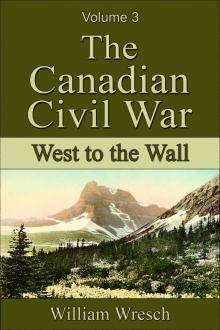 The Canadian Civil War: Volume 3 - West to the Wall
The Canadian Civil War: Volume 3 - West to the Wall